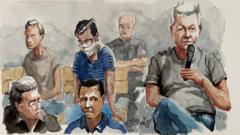In a trial that has captivated and horrified France, 50 men accused of raping Ghisèle Pelicot face decades behind bars. The case unfolds against a backdrop of social normalcy and collective denial, with defendants presenting defenses rooted in manipulation, coercion, and a shocking lack of accountability while the victim challenges their narratives.
The Collective Denial: Unraveling the Ghisèle Pelicot Rape Case

The Collective Denial: Unraveling the Ghisèle Pelicot Rape Case
Fifty men face over 600 years in prison as they stand trial for the systematic rape of Ghisèle Pelicot, an ordeal that has shocked France and brought societal issues to the forefront.
The trial of fifty men accused of the systematic rape of Ghisèle Pelicot has gripped France, exposing uncomfortable truths about societal norms and the nature of complicity. Each defendant faces the prospect of lengthy jail sentences, with the collective maximum potential nearing 600 years. This disturbing case is punctuated by the fact that the defendants are described as a reflection of everyday society, encompassing diverse backgrounds including professionals and blue-collar workers.
The trial began in September and has since unraveled a harrowing tale of exploitation, with all defendants linked to Ghisèle Pelicot through her husband, Dominique Pelicot, who drugged her over a decade using prescription sleeping pills. These fifty men, referred to as “Monsieur-Tout-Le-Monde” or “Mr. Everyman,” have presented a range of emotional responses in court—from defiance to shame—as they are confronted with their roles in a protracted cycle of abuse.
Judges have noted a wealth of evidence, including videos taken by Dominique Pelicot, which keeps many of the accused from contesting their presence at the Pelicot home but allows them to dispute the severity of their alleged crimes. Their justifications are varied, with claims ranging from ignorance of Ghisèle's incapacity to participate to suggestions they were tricked into the interactions. "My body raped her, but my brain didn't," one defendant stated, illustrating the convoluted defense mounting against the allegations.
Among them, Jean-Pierre M stands apart as the only accused not charged with rape, instead taking a role as a perpetrator himself under the influence of Dominique Pelicot. Prosecutors have sought harsh sentences for the defendants, emphasizing aggravating factors tied to the gruesome evidence presented in court.
As the trial continues to unfold, the emotional turmoil has spread to families of the accused, many of whom struggle to reconcile the men they know with the heinous accusations leveled against them. Sentiments of disbelief and confusion abound; several family members have noted significant changes in behavior attributed to personal crises that may have predisposed the defendants to associate with Dominique Pelicot.
Confronted with these realities, the victim, Ghisèle Pelicot, has vocally opposed any justifications for her rapists’ actions. Her unwavering stance highlights the central theme of accountability and the need for societal introspection. The trial is poised to culminate in a series of controversial verdicts that will leave long-lasting impressions on French society regarding consent, violence, and the grim realities of systemic abuse.




















